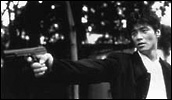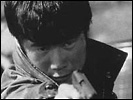Tokarev
- Year
- 1994
- Original title
- Tokarefu
- Japanese title
- トカレフ
- Director
- Cast
- Running time
- 103 minutes
- Published
- 20 September 2003



by Tom Mes
While on his daily route as the driver of the local school bus, Michio Nishiumi (Yamato) sees his own infant son kidnapped from the vehicle by a masked assailant with a gun. The little boy in hand, the kidnapper knocks a man off his motorcycle and uses the bike to flee, leaving no trace. The bike belonged to Michio's neighbour Matsumura (Sato), who comes out of the scuffle with a broken arm.
Michio and his wife Ayako (Nishiyama) are heartbroken to see their only child taken from them, all the more so when the police blow their only chance to retrieve the boy during a ransom exchange. Tensions between the couple increase in the weeks that follow. With no leads, Ayako slowly starts to give up hope of ever seeing her son again and wants to leave the tragedy behind her, but Michio remains convinced that there are ways of finding out the truth. On top of this comes the fact that the substantial sum of the ransom money has put them in debt with Michio's employer.
As the couple slowly drift apart, Ayako starts to confide in their neighbour Matsumura, who she felt an attraction to even before the incident. Michio however becomes convinced that Matsumura is in some way involved in the kidnapping and that his presence that day was not a coincidence. When he spots his neighbour in the crowd on a home video of his son's school sporting event, he starts to harass Matsumura in the hopes of getting a confession out of him.
What up until this point has been a confidently handled if somewhat conventional kidnapping drama, now careens off into thoroughly unpredictable territory. Sakamoto's script presents us with a shocking double twist that is best left unmentioned in this review, and which feels like having solid ground removed from under your feet for a few moments, to be replaced by something a lot more unstable. It's a daring move, one that initially pays off and takes the film to great heights.
Unfortunately the script's initially smart twists make way for illogicalities as the film progresses. This is a great shame, as Tokarev (named after the Russian gun used in the kidnapping, which plays a central role in the narrative) is superbly handled in nearly all other departments. Sakamoto tells his story slowly but surely, often using purely visual means rather than dialogue to communicate with his audience. His pacing is exemplary and his habit of not giving the viewer any inkling of exactly how much time has passed pays off rather well, making Michio's determination seem all the stronger. An alumnus of director Junji Sakamoto's 1989 debut film Knock-Out (Dotsuitarunen), Takeshi Yamato is astonishingly good in the central role, especially when one knows about the less than impressive performances this former boxer delivered in such botched staight-to-video action pap as Takashi Miike's Bodyguard Kiba series around the same time. In Tokarev his portrayal of the tortured Michio is never less than thoroughly convincing.
Even when it goes off the rails, the film certainly remains watchable. Its strengths are too apparent for it to be anything less. But if it hadn't been for the gaping plot holes and unlikely turns of events that pepper the film's second half, as well as the severely underwritten role of Ayako (an indication of Sakamoto's predominant fascination with machismo at the time), Tokarev might have been an absolute scorcher.